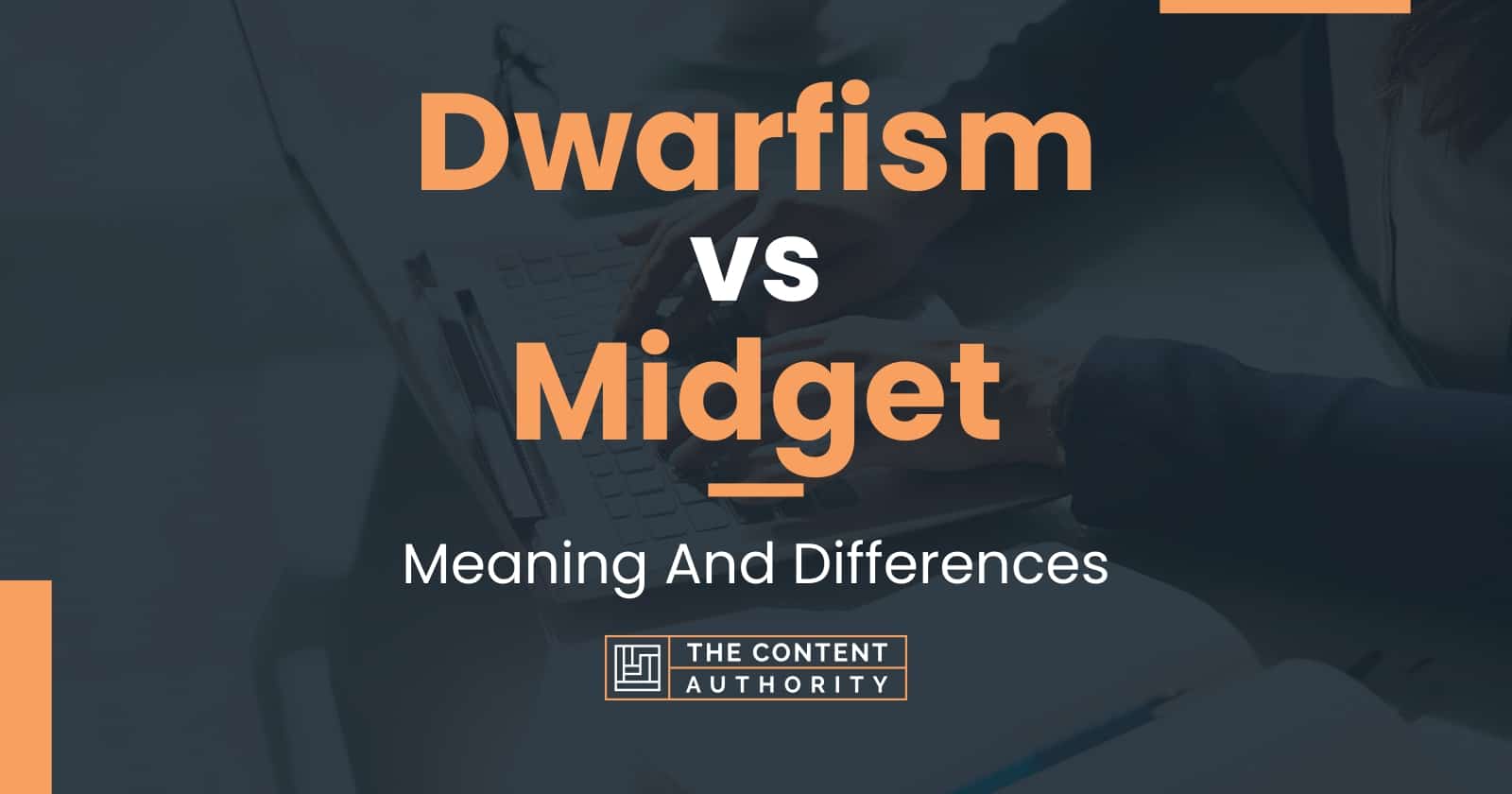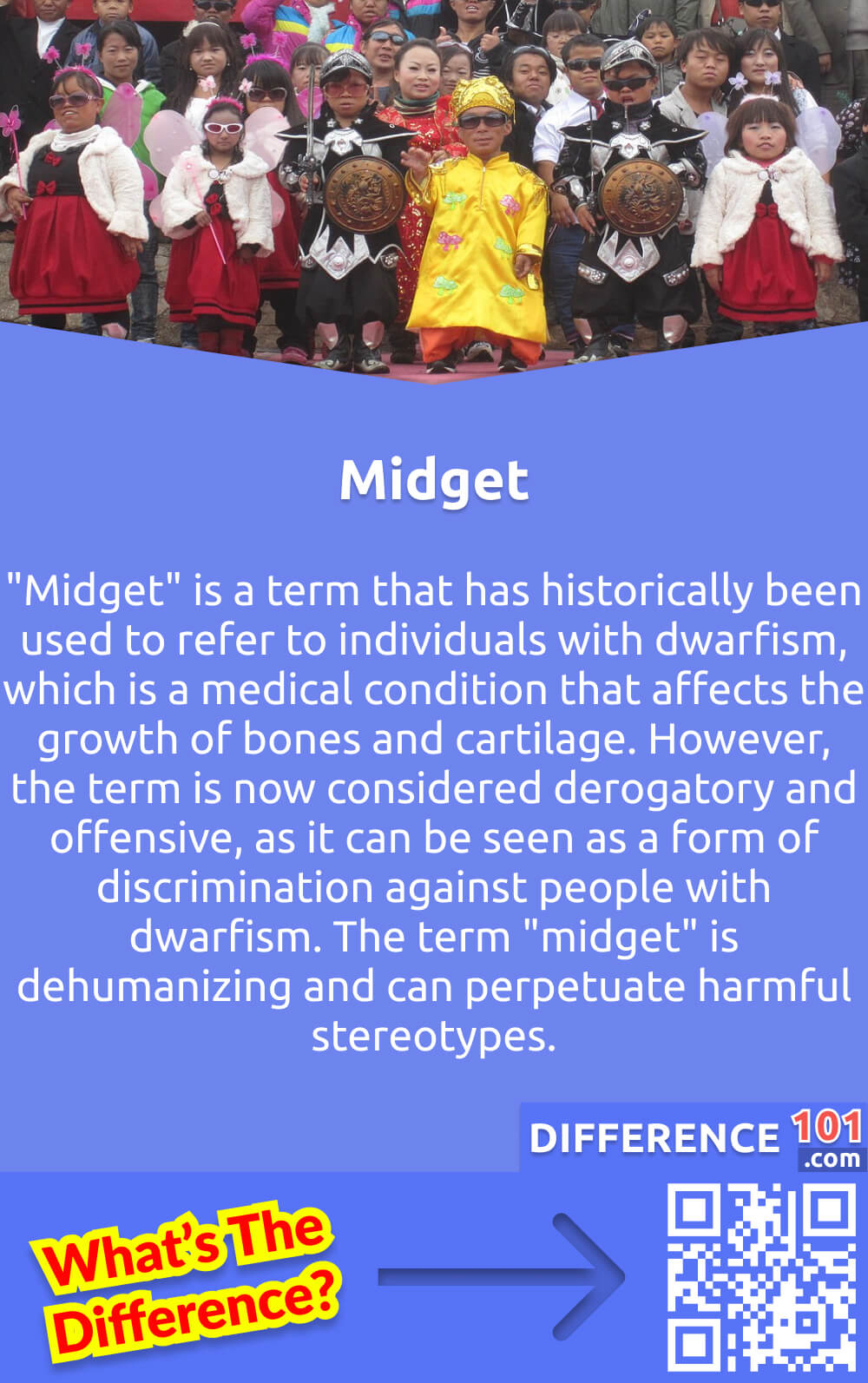You might’ve stumbled upon the term “midget” somewhere in your life—maybe in old movies, books, or even in casual conversations. But what exactly does it mean? Is it appropriate to use today? And why has this word sparked so much debate over the years?
Let’s dive into the nitty-gritty of the word “midget.” This isn’t just a dictionary definition; it’s a deep dive into the cultural, historical, and social implications of a term that’s been around for centuries. We’ll explore where it came from, how it’s been used, and why it’s considered offensive by many today.
Understanding the meaning of “midget” goes beyond just knowing the word itself. It’s about acknowledging the people who’ve been affected by it, the history behind it, and how language evolves over time. So buckle up, because this is gonna be an eye-opening ride!
Read also:Costco Is Bringing Back Its 20 Membership Deal But Hurry Up Its Only For A Limited Time
Table of Contents
- The History of the Word "Midget"
- What Does "Midget" Actually Mean?
- How Has the Word Been Used Over Time?
- Why Is the Word Considered Offensive?
- What Are Better Alternatives?
- The Cultural Impact of the Term
- Disability Rights and Language Evolution
- Media Representation of "Midgets"
- A Modern Perspective on the Word
- Conclusion: Moving Forward
The History of the Word "Midget"
The word "midget" first appeared in the English language in the 19th century, and its origins are deeply tied to the world of entertainment and freak shows. Back in those days, people with dwarfism were often showcased in circuses and sideshows as curiosities. The term “midget” was used to describe individuals who were proportionate in size but much shorter than average. It was considered a scientific term at the time, but it quickly became associated with exploitation and dehumanization.
By the early 20th century, the word had already begun to carry negative connotations. As society evolved and became more aware of the ethical issues surrounding exploitation, the use of the term started to decline. However, it still lingers in popular culture, often used casually without much thought to its historical baggage.
From Scientific Term to Slang
Here’s the deal: the word “midget” started out as a way to classify individuals with dwarfism based on their physical proportions. But over time, it morphed into something much darker—a label that reduced people to objects of curiosity rather than human beings with dignity and worth. This shift highlights how language can evolve, often for the worse.
- In the 1800s, “midget” was used in medical contexts.
- By the 1900s, it was widely used in entertainment.
- Today, it’s largely considered derogatory.
What Does "Midget" Actually Mean?
Let’s break it down. The dictionary definition of “midget” refers to a person of unusually small stature, typically due to a medical condition like dwarfism. However, the term has been misused and misapplied so frequently that its original meaning has become overshadowed by its negative implications.
It’s important to note that dwarfism itself is a broad term that encompasses various medical conditions, such as achondroplasia and hypopituitarism. These conditions affect bone growth and development, resulting in shorter stature. But labeling someone as a “midget” ignores the complexity of their condition and reduces them to a stereotype.
Breaking Down the Misconceptions
One of the biggest misconceptions about the word “midget” is that it’s interchangeable with “dwarf.” While both terms refer to individuals of short stature, they carry very different meanings and implications. Here’s a quick rundown:
Read also:Lottery Winner Bags A 36 Million Jackpot Then Wakes Up At 430 Am And Goes To Work Like Any Other Day
- Dwarf: A more neutral term used in medical and scientific contexts.
- Midget: A term historically used to describe proportionate dwarfs, but now widely considered offensive.
How Has the Word Been Used Over Time?
Language is a living thing, and the way we use words changes over time. In the case of “midget,” its usage has shifted dramatically from its early days as a scientific term to its current status as a derogatory slur. Let’s take a look at how this word has been used throughout history.
In the 19th and early 20th centuries, “midget” was commonly used in sideshows and circuses to describe performers with dwarfism. These shows often portrayed individuals as exotic or abnormal, reinforcing harmful stereotypes. Even in popular media, the word was used casually, without much consideration for its impact.
From Sideshow Acts to Modern Media
Fast forward to today, and you’ll find that the word “midget” is rarely used in formal contexts. However, it still pops up in casual conversations, often as a joke or insult. This casual use is part of the problem—it normalizes the word and perpetuates its negative connotations.
Here’s a breakdown of how the word has been used across different eras:
- 1800s: Used in scientific and medical circles.
- 1900s: Popularized in entertainment and media.
- Today: Widely considered offensive and outdated.
Why Is the Word Considered Offensive?
This is where things get serious. The word “midget” is considered offensive because of its history of exploitation and dehumanization. When you use the word, you’re not just labeling someone based on their physical appearance—you’re reinforcing centuries of harmful stereotypes.
For individuals with dwarfism, the word carries a lot of baggage. It reminds them of a time when they were treated as curiosities rather than human beings. It reduces their identity to a single characteristic and ignores the complexity of who they are as people.
The Psychological Impact
Words have power, and the impact of using offensive language can be profound. Studies have shown that derogatory terms can lead to feelings of shame, isolation, and low self-esteem in those who are targeted. This is especially true for marginalized groups, who already face systemic discrimination and stigma.
Here’s a quick look at the psychological effects of using offensive language:
- Increased feelings of marginalization.
- Reinforcement of negative stereotypes.
- Damage to self-esteem and identity.
What Are Better Alternatives?
So, if “midget” is off the table, what should we say instead? The answer lies in using language that respects and empowers individuals with dwarfism. Instead of focusing on their physical characteristics, we can use terms that emphasize their humanity and individuality.
Here are some better alternatives:
- Person with dwarfism: A neutral term that acknowledges the condition without reducing the person to it.
- Little person: A term widely accepted by the dwarfism community, emphasizing individuality and dignity.
Why Language Matters
The words we choose matter because they shape the way we think and interact with the world. By using respectful language, we can create a more inclusive and compassionate society. It’s not just about being politically correct—it’s about being kind and considerate.
The Cultural Impact of the Term
The word “midget” has had a significant impact on popular culture, influencing everything from movies and TV shows to literature and art. Its use in media has perpetuated harmful stereotypes and reinforced negative perceptions of individuals with dwarfism.
Take, for example, the portrayal of “midgets” in classic films like “The Wizard of Oz” or “The Hunchback of Notre Dame.” These characters were often depicted as comical or tragic figures, reinforcing the idea that people with dwarfism were somehow less than human. Even today, media representation of individuals with dwarfism is often limited to these narrow stereotypes.
Changing the Narrative
Thankfully, there’s been a push in recent years to change the narrative and provide more nuanced representation. Shows like “Little People, Big World” and films like “The Peanut Butter Falcon” have helped to humanize individuals with dwarfism and showcase their lives in a more positive light.
Disability Rights and Language Evolution
The evolution of language surrounding disability rights is a testament to the power of advocacy and activism. As society becomes more aware of the issues faced by marginalized groups, language evolves to reflect that understanding. The shift away from terms like “midget” is just one example of this progress.
Disability rights activists have been instrumental in promoting the use of respectful language and challenging harmful stereotypes. Their work has helped to create a more inclusive and equitable society, where individuals with disabilities are valued and respected.
The Role of Advocacy
Advocacy plays a crucial role in shaping the way we think and talk about disability. By raising awareness and challenging harmful language, activists help to create a more inclusive world. This is especially important for individuals with dwarfism, who have historically been marginalized and excluded from mainstream society.
Media Representation of "Midgets"
Media representation is a double-edged sword. On one hand, it has the power to shape public perception and promote understanding. On the other hand, it can perpetuate harmful stereotypes and reinforce negative attitudes. The way “midgets” have been portrayed in media over the years reflects this tension.
From the early days of sideshows to modern-day TV shows, the representation of individuals with dwarfism has been inconsistent at best. While some portrayals have been positive and empowering, others have been exploitative and dehumanizing.
Towards Positive Representation
As media continues to evolve, there’s hope for more positive and accurate representation of individuals with dwarfism. By amplifying their voices and showcasing their stories, we can create a more inclusive and understanding society.
A Modern Perspective on the Word
In today’s world, the use of the word “midget” is largely considered outdated and offensive. As society becomes more aware of the impact of language, there’s a growing movement to replace derogatory terms with more respectful alternatives. This shift reflects a broader commitment to inclusivity and equity.
For individuals with dwarfism, the move away from terms like “midget” is a sign of progress. It acknowledges their humanity and individuality, and it promotes a more compassionate and understanding society.
Looking to the Future
The future of language surrounding disability rights is bright. As we continue to evolve and grow as a society, we have the opportunity to create a world where everyone is valued and respected. By choosing our words carefully and thoughtfully, we can make a real difference in the lives of those around us.
Conclusion: Moving Forward
In conclusion, the word “midget” is a relic of a bygone era—a term that’s steeped in exploitation and dehumanization. While its origins may have been rooted in science, its use has evolved into something much darker. Today, it’s widely considered offensive and outdated, and for good reason.
By choosing more respectful and inclusive language, we can create a world where everyone feels valued and respected. Whether it’s using terms like “person with dwarfism” or “little person,” the key is to prioritize humanity and individuality over stereotypes and labels.
So, the next time you’re tempted to use the word “midget,” take a moment to think about its impact. Choose kindness and compassion instead. And remember, language has the power to shape the world around us—so let’s use it wisely.
What do you think about the evolution of language surrounding disability rights? Share your thoughts in the comments below, and don’t forget to check out our other articles on topics that matter!


